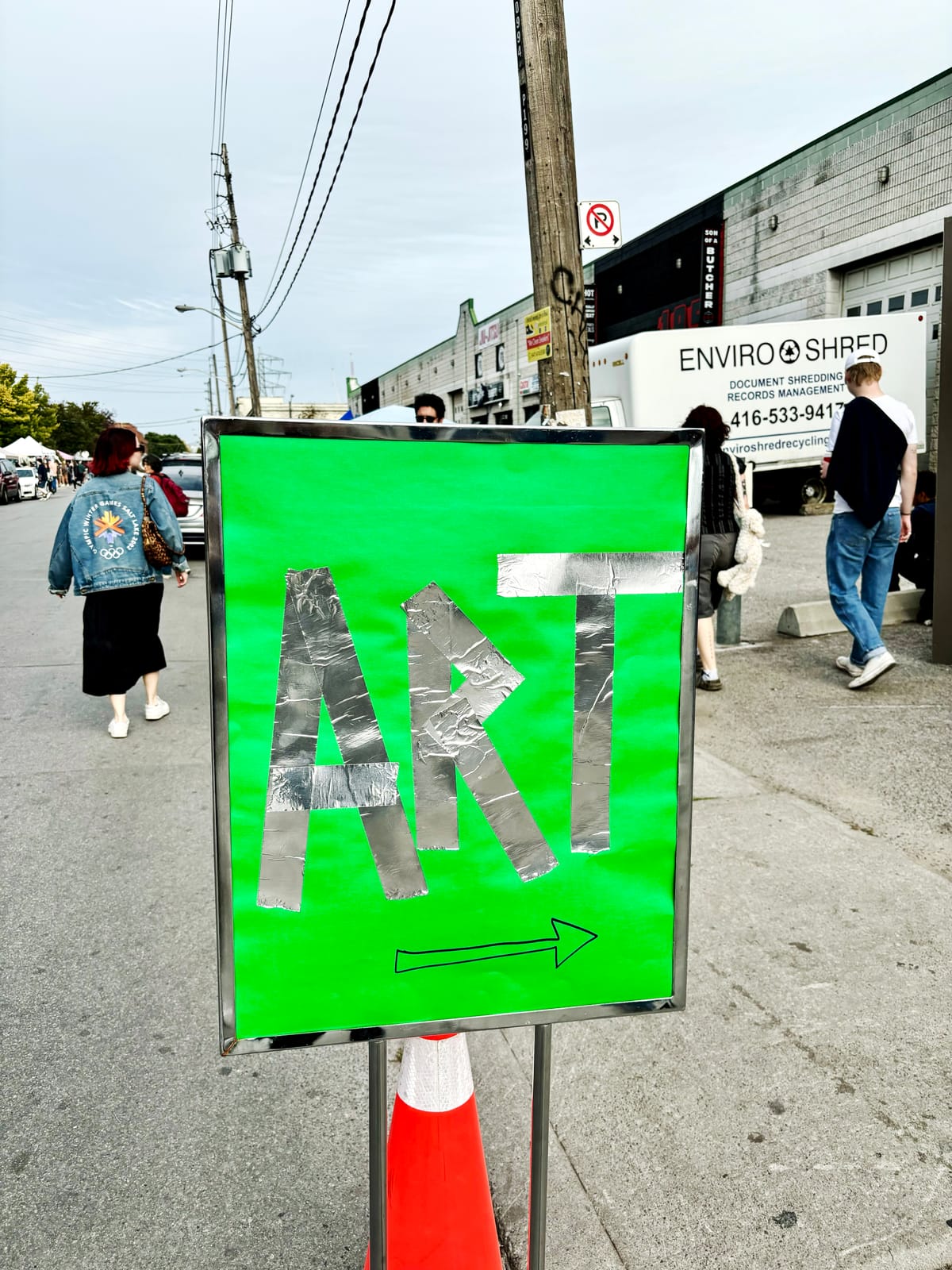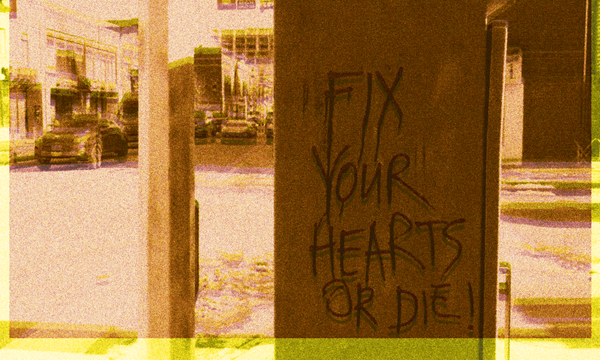Wrapped will never love you back
Spotify is a garbage ball rolling around the idea of a life and gathering all things onto itself, like a kind of Wario Katamari Damacy.

I grew up in the Yukon, removed from the world and from culture and all things, and the grandest moment in any young person's life was when they had proof they had been somewhere else and returned shaped by culture. Legends were built around anyone who had been to a city, a real city, and been a part of something bigger than the trappings of our small isolated little town. I will never forget the day I saw Neil walking down the hall of lockers in our junior high school, the ones that led away from the front doors and the principles' office, wearing an oversized white t-shirt with the album artwork for Silverchair’s 1995 debut Frogstomp on the front and tour dates listed on the back. One of those dates the show his older brother had been to, his older brother who had brought the shirt back for Neil to peacock around in.
Wearing that shirt built him into something, even if it was just in my eyes and even if it was just that day, it built him into something big and real and exciting. He was always cool, but in that moment cool became something tangible. Because I liked Silverchair too. I felt connected to someone suddenly at long last. I was a quiet, introverted kid who didn’t make friends easily, who opted to spend time alone riding my bike to the library to borrow weird science fiction books and Stephen King novels because the movies were too scary to rent. Headphones lived on my head in those years, an extension of my ears and my quiet, scared little heart. Seeing that Silverchair shirt felt like a lifeline into a conversation I longed to be a part of.
This is the great and beautiful promise of music, building bridges between tender hearts, crafting invitations to conversations and building worlds for people to lose themselves in together. Once I knew about the Silverchair thing, we could talk about tangental favourites, Green Day and NOFX, our favourite Nirvana songs. We could be friends, or something that felt like it, and that was enough for a little while. Friends built of a shared understanding, threads connecting common desires.
This morning my Instagram feed is populated with stories of screenshots, top five lists on splashy graphic design backgrounds with the Spotify logo in the bottom corner. People are surprised that they listened to SO MUCH Mitski this year, forgetting that this year was a year that demanded so much Mitski. Others are unsurprised to see cherished favourites dragged up to the top of the pile. The MJ Lenderman record, Kendrick’s reign at the tail end of the year. The surprise drop of a new record from The Cure. Spotify Wrapped reminds people of the year that was, and in many ways this is a harmless, fun, beautiful little moment. It is the hallway of a thousand eternal high schools, it is communal remembrance, it is sharpened teeth hiding behind a pleasant smile.
Wrapped, like all monsters built by man, started as an innocent idea. In its earliest iteration, in 2015, it was Your Year In Music. A small and basic list that catalogued that years’ listening habits. That year, you could see that you listened to a LOT of To Pimp a Butterfly or Carly Rae Jepsen’s Emotion, and you could share it, albeit clumsily, to social media. You could connect yourself like beats on a storyboard with thread to all those who shared your habitual memories. It wasn’t until an intern, Jewel Ham, designed the Wrapped concept as an aesthetically pleasing idea for an internal project she would receive no compensation for. This is where Spotify starts to show its fangs.
Wrapped became a phenomenon in short order, and now tens of millions of users engage with it every year in the early days of December. This year, Spotify announced they would track users' data for longer than normalso users could game their stats accordingly. Music listening becomes fantasy football in a thousand little arenas, the obsession with Billboard charts and Spotify year-end positions. Other companies took note of this trend and eagerly chased the same tired hare. Apple Music does their own version called Replay. YouTube and Tidal have their own spin on the formula as well. The podcast app I use, Pocket Casts, gave me my yearly wrap last week which reminded me I listened to an episode of one show that was 15+ hours long.
I walked a lot while writing the book, and podcasts about video games helped when I couldn’t think about music for even a second more.
Spotify is a garbage ball rolling around the idea of a life and gathering all things onto itself, like a kind of Wario Katamari Damacy. Not because it likes them and not because it cares, but because all these things make it appear bigger, bolder, and flashier. Spotify has audiobooks now, it has podcasts, it pays Joe Rogan $250-ish million. It still hasn’t delivered on its long promise of higher fidelity audio. It cut 200 jobs from its podcast division. And now, this year, it has replaced the people who used to live in the eternal hallways of its design with lifeless recreations, AI podcasts powered by Google that simulate conversations between fictional podcast hosts, almost like the people they used to employ, that talk about your habits as if they’re real. As if any of this is.
Slowly, the human element is stripped away from the rooms of our lives like weathered wallpaper. Slowly the thing you liked, the aesthetically pleasing graphics in perfect 16:9 for optimum Meta placement, become less fun. They become stats, they become data, they become nothing.
Spotify pays artists for shit. This isn’t even a secret anymore, this is accepted information, like the roundness of the earth and the fact that the Brontosaurus was never real. Spotify Wrapped season also brings in Spotify Contrarian season (hi) and with it people will point out that Spotify pays artists $.003 and $.005 per stream, where Apple pays $.01 per stream. We share these numbers and are supposed to somehow feel better for using Apple Music, as if the lessening of 0’s on the wrong side of the decimal is a moral superiority.
Spotify, in its infinite capacity for evil, stopped paying artists below a certain threshold at all this year. Artists now have to meet certain criteria to be worth renumeration for their labour. And this is only the beginning, we can look at this garbage ball and see that there is still detritus and data to gather unto itself. Algorithms, like Spotify’s, feed off listener data. This informs the system, pushes the cold agenda of a homunculus of ideas in abstract fed into the core where a soul might otherwise reside. It doesn’t care for mood or energy, it knows only the information it has been fed and what to spit out when it’s full and ready.
I don’t have a strong enough working background in AI, data mining and algorithms, but I would imagine the more data scraped by the machine, the more it focuses on who gets paid, who gets pushed into feeds and streams and playlists. Who appears in wrapped at the end of it all. Who earns the fractions of pennies, and who does not. The artists I see in everyone’s lists are largely the same. Taylor Swift, Drake, Noah Kahan. Sabrina Carpenter. They’re all here, like they always are, and we are reminded of a year dominated by conversations around 1% of artists. Algorithms and data post their wrapped, bundled with nonsensical collective genre ideas like Pink Pilates Princess Holiday Afrobeat. AI made these too, The machine feeds, and the machine spits out perfectly sized graphics for sharing. We are so close to be an unnecessary participant in this dance at all. Skin and sinew replaced by 1s and 0s who one day will no longer need our bodies to track our data.
The human element of this all has gone cold, and every year it feels worse to bear witness the void of Wrapped posting, but I am not immune to its charms either. As soon as my Apple Replay was ready, I shared screen grabs of it to my own Instagram feed. I responded to people's DMs about my results, most of which are largely reflective of the fact that I wrote a book this year called the Dad Rock That Made Me a Woman.
But this is me holding on. Music, for me, has always benefited from the conversation around it. Talking about songs and artists and the year that was is meant to foster this environment, build bridges made of fine thread between us all as we recount the days behind and those still to come. Slowly, quietly, that thread has been replaced with steel, cold to the touch. Wrapped isn’t about connection as much as it is about data mining, which already feels bad enough without the reminder that Spotify CEO Daniel Ek is a primary shareholder in a company that builds AI-powered predator drones. They claim they’re “one of the good ones”, and only sell their drones to democracies, if that makes the weight of it all somehow bearable. But who decides a democracy, and where does the data come from in all of this.
Your Spotify Wrapped for 2024 is the weight of all these things, whether we want to deal with it or not. AI-powered podcasts are the result of expunging the lives of the real humans who built these ideas, replacing them with a facsimile of human connection. Your data feeds into Google, and it builds you the idea of a friend in return. Artists will slowly be unable to afford to be artists at all, but the machine has enough data to recreate the things it knows you love. It can create podcasts, it can create something that feels so much like life you can imagine it breathing and bleeding. And then, one day, we will stop, and we will wonder where all the tangible parts of this world have gone and forget how easily they were all replaced with 1s and 0s.




